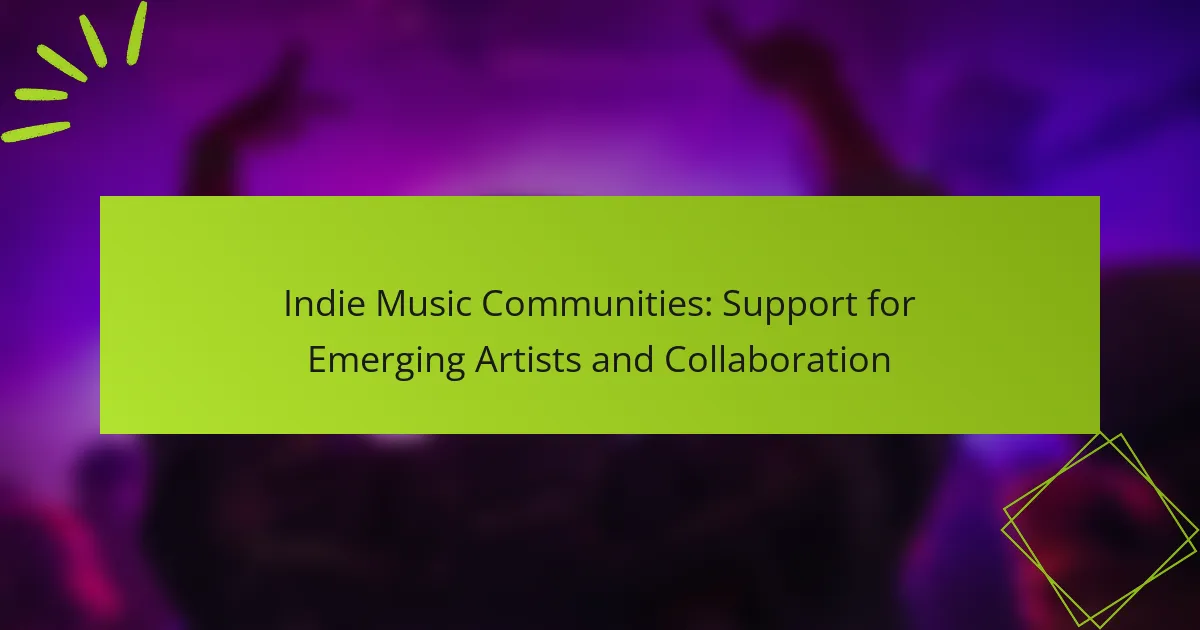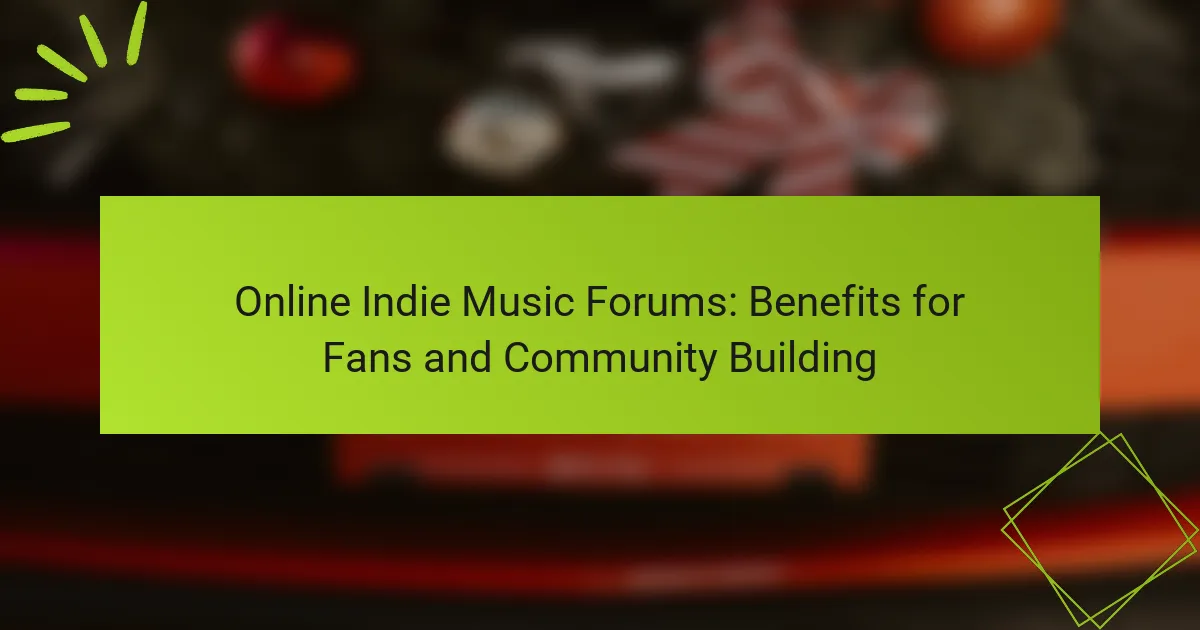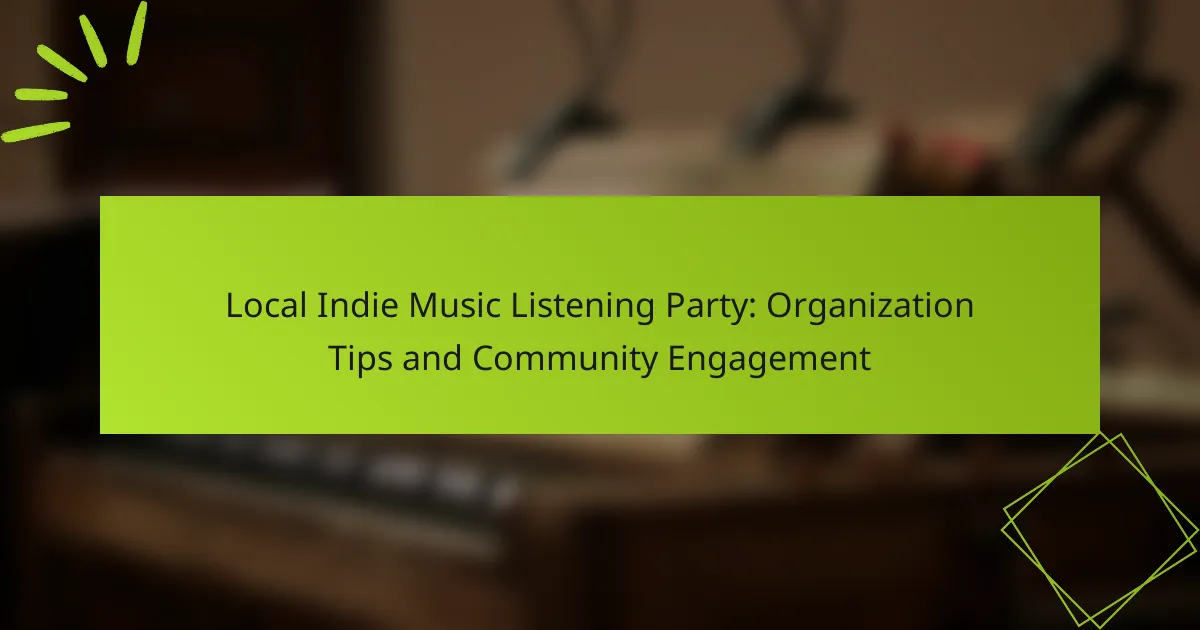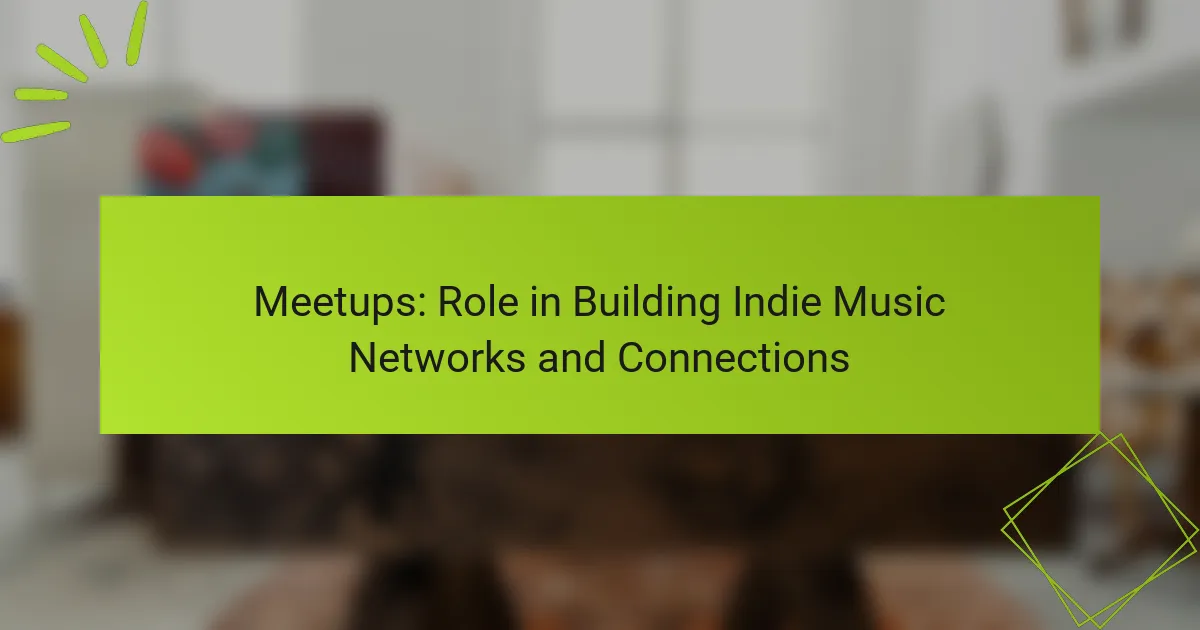Indie music communities play a crucial role in nurturing emerging artists by offering networking opportunities, collaborative projects, and promotional resources. These supportive environments empower new talent to gain visibility and connect with like-minded musicians, ultimately enhancing their chances of success in a competitive industry.

How do indie music communities support emerging artists?
Indie music communities provide essential support for emerging artists through networking, collaboration, resource sharing, and promotion. These elements create an environment where new talent can thrive and gain visibility in a competitive industry.
Networking opportunities
Indie music communities foster networking opportunities that connect emerging artists with peers, mentors, and industry professionals. These connections can lead to collaborations, gigs, and valuable advice that can help shape an artist’s career.
Participating in local events, open mics, and online forums can significantly expand an artist’s network. Engaging with others in the community can lead to lasting relationships that provide ongoing support and collaboration.
Collaborative projects
Collaboration is a cornerstone of indie music communities, allowing artists to work together on projects that enhance their creativity and reach. Joint efforts can include co-writing songs, producing albums, or organizing live performances.
These collaborative projects not only enrich the artistic process but also help artists tap into each other’s audiences, increasing their visibility. For example, a small band might team up with a solo artist to create a unique sound that attracts fans from both sides.
Resource sharing
Resource sharing is vital in indie music communities, where artists often exchange knowledge, tools, and materials. This can include sharing recording equipment, studio space, or even promotional strategies.
Artists can benefit from online platforms where they can access tutorials, workshops, and guides on various aspects of music production and marketing. This collective approach reduces costs and enhances the skills of all involved.
Promotion and visibility
Promotion and visibility are critical for emerging artists, and indie music communities excel in these areas. Through social media, local events, and community newsletters, artists can reach wider audiences without the need for a major label.
Participating in community-driven initiatives, such as compilation albums or local festivals, can significantly boost an artist’s profile. Leveraging these platforms allows artists to showcase their work and connect with potential fans and industry contacts.
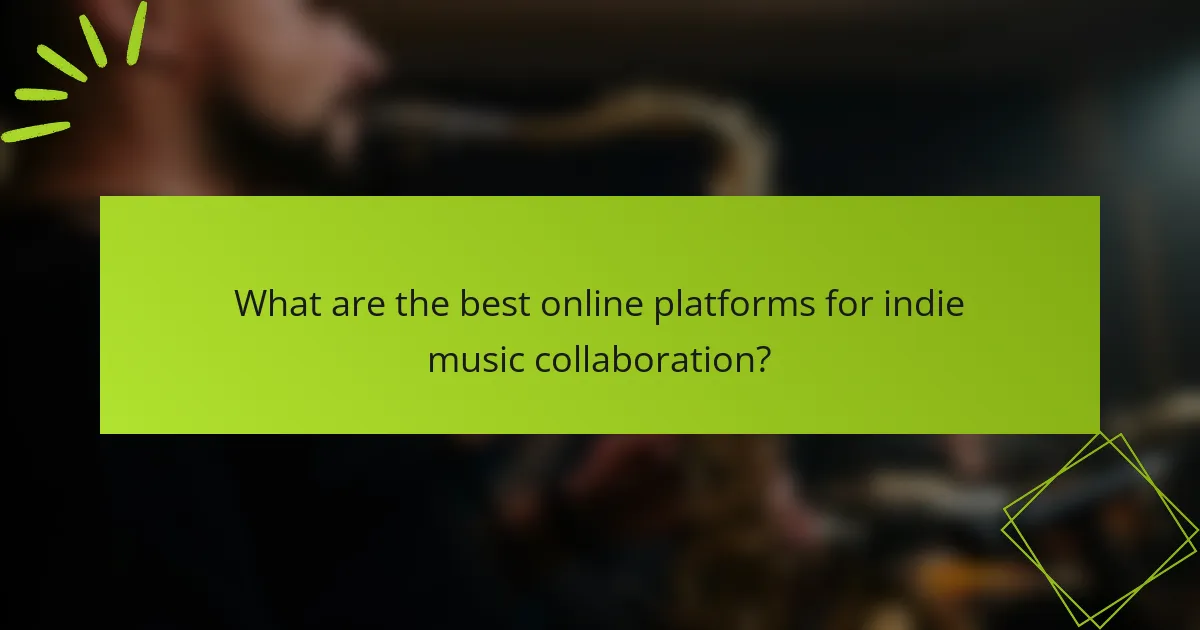
What are the best online platforms for indie music collaboration?
The best online platforms for indie music collaboration provide tools for sharing, creating, and promoting music together. These platforms facilitate connections between emerging artists, allowing them to collaborate on projects and reach wider audiences.
SoundCloud
SoundCloud is a widely used platform for indie musicians to upload and share their tracks. It allows artists to receive feedback from listeners and collaborate with other musicians through comments and direct messaging.
To maximize collaboration on SoundCloud, artists should actively engage with other users by commenting on tracks and sharing their own work. Utilizing tags effectively can also help in reaching the right audience and attracting potential collaborators.
Bandcamp
Bandcamp serves as both a music distribution platform and a community for indie artists. Musicians can sell their music directly to fans, offering options for digital downloads, physical merchandise, and even subscription services.
For collaboration, Bandcamp allows artists to feature guest musicians on their tracks, promoting joint projects. Artists should consider offering exclusive content or limited-time releases to encourage collaboration and build a loyal fanbase.
Splice
Splice is a cloud-based platform designed for music production and collaboration. It provides access to a vast library of samples and loops, enabling artists to create music together in real-time, regardless of their location.
To effectively use Splice, artists can start by sharing their projects and inviting others to contribute. Utilizing the version control feature helps keep track of changes and ensures a smooth collaborative process.
Facebook Groups
Facebook Groups offer a space for indie musicians to connect, share resources, and collaborate on projects. Many groups focus on specific genres or aspects of music creation, making it easier to find like-minded artists.
To benefit from Facebook Groups, artists should actively participate by sharing their work, asking for feedback, and offering assistance to others. Joining multiple groups can expand networking opportunities, but it’s essential to follow group rules to maintain a positive community atmosphere.

How can emerging artists leverage social media for support?
Emerging artists can effectively use social media to gain support by building connections with fans, engaging actively, and showcasing their music. Platforms like Instagram, TikTok, and Twitter offer unique opportunities for artists to reach wider audiences and foster community.
Building a fanbase
To build a fanbase, artists should consistently share content that resonates with their target audience. This includes posting updates about their music, behind-the-scenes looks, and personal stories that create a connection. Engaging visuals and relatable content can attract followers and turn them into dedicated fans.
Utilizing hashtags relevant to the indie music scene can help increase visibility. Collaborating with other artists or influencers can also introduce new audiences to an artist’s work, expanding their reach significantly.
Engaging with followers
Engagement is crucial for maintaining a loyal fanbase. Artists should respond to comments, messages, and mentions to foster a sense of community. Hosting Q&A sessions or live streams allows for real-time interaction, making fans feel valued and connected.
Regularly asking for feedback on new music or ideas for future projects can also enhance engagement. This two-way communication encourages fans to feel invested in the artist’s journey.
Showcasing new music
Social media is an excellent platform for showcasing new music. Artists can share snippets of upcoming tracks, music videos, or live performances to generate excitement. Platforms like TikTok are particularly effective for viral music promotion, where catchy hooks can lead to widespread sharing.
Consider creating a release strategy that includes countdowns, teasers, and exclusive previews for followers. This approach not only builds anticipation but also encourages fans to share the content, amplifying reach and engagement.
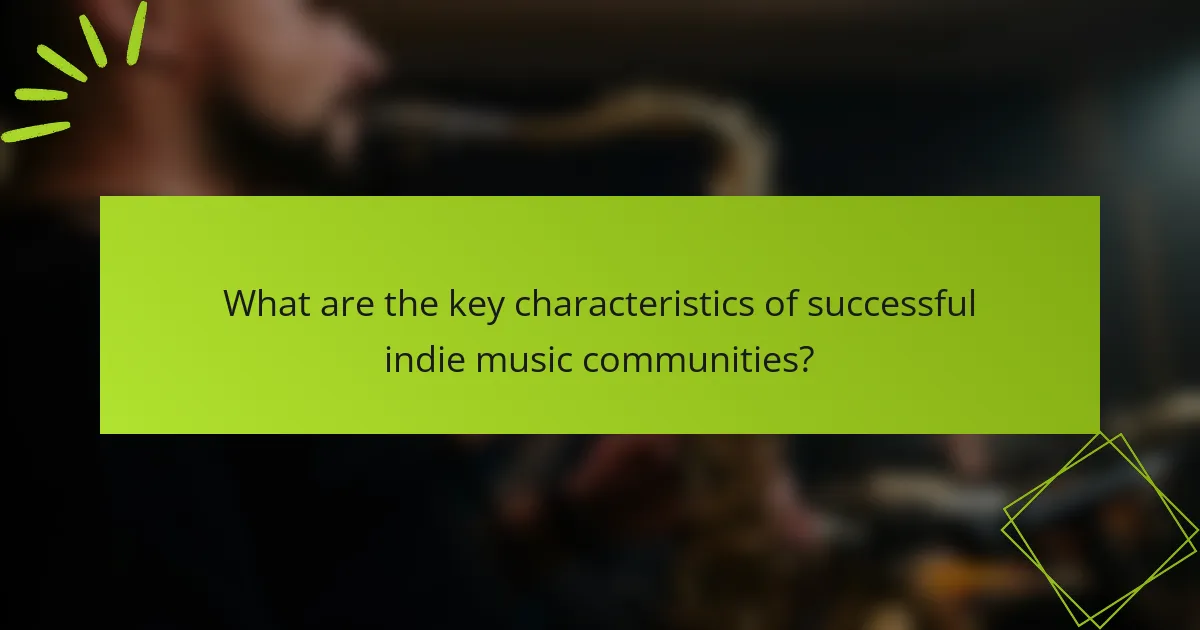
What are the key characteristics of successful indie music communities?
Successful indie music communities are characterized by their inclusivity, active member participation, and a strong focus on collaboration. These elements create an environment where emerging artists can thrive and connect with others in the industry.
Inclusivity and diversity
Inclusivity and diversity are essential for fostering a vibrant indie music community. By welcoming artists from various backgrounds, genres, and experiences, these communities encourage a rich exchange of ideas and creativity. This diversity can lead to innovative collaborations and a broader audience reach.
To promote inclusivity, community organizers should actively seek out underrepresented voices and provide platforms for them to share their work. This might include hosting open mic nights, workshops, or online forums that cater to different musical styles and cultural influences.
Active member participation
Active member participation is crucial for the vitality of indie music communities. Engaged members contribute to discussions, share resources, and support one another’s projects, creating a sense of belonging and shared purpose. Regular events, both online and offline, can help maintain high levels of engagement.
Communities can encourage participation by offering incentives, such as showcasing member performances or providing opportunities for feedback on new music. Setting up a structured calendar of events can also help members plan their involvement and stay connected.
Focus on collaboration
A strong focus on collaboration distinguishes successful indie music communities. By facilitating partnerships among artists, these communities can help members create new music, share skills, and expand their networks. Collaborative projects often lead to unique sounds and innovative approaches to music-making.
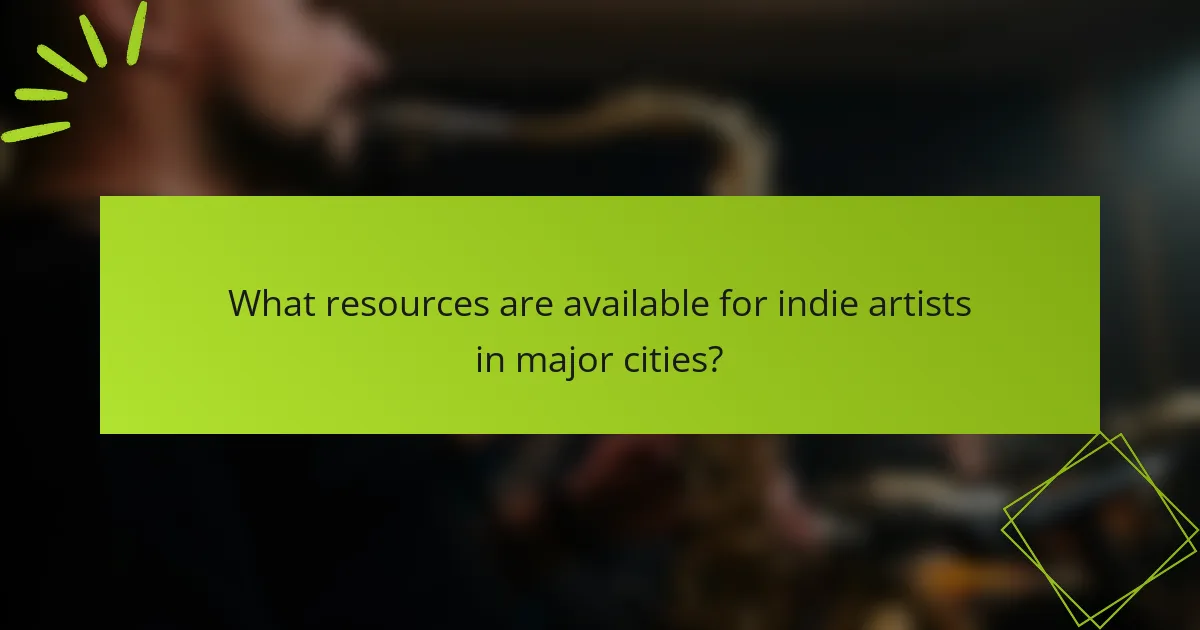
What resources are available for indie artists in major cities?
Indie artists in major cities can access a variety of resources designed to support their growth and collaboration. These include local music venues, artist collectives, and workshops that foster community and skill development.
Local music venues
Local music venues play a crucial role in the indie music scene by providing spaces for artists to perform and connect with audiences. Many cities have a range of venues, from small bars to larger clubs, that cater specifically to emerging talent.
When selecting a venue, consider factors such as capacity, acoustics, and the type of audience it attracts. Some venues may offer open mic nights or showcase events that allow indie artists to gain exposure without the pressure of a full concert.
Artist collectives
Artist collectives are groups of musicians and creatives who collaborate to support each other’s work. These collectives often provide resources like shared rehearsal spaces, promotional assistance, and networking opportunities.
Joining a collective can enhance an artist’s visibility and provide access to a community of like-minded individuals. Look for collectives that align with your musical style and goals, as this can lead to fruitful collaborations and performances.
Workshops and seminars
Workshops and seminars are valuable resources for indie artists looking to develop their skills and knowledge. These events often cover topics such as songwriting, marketing, and music production, providing practical insights from industry professionals.
Participating in these educational opportunities can help artists refine their craft and learn about the business side of music. Many cities host regular workshops, so check local listings or community boards to find upcoming events that suit your interests.
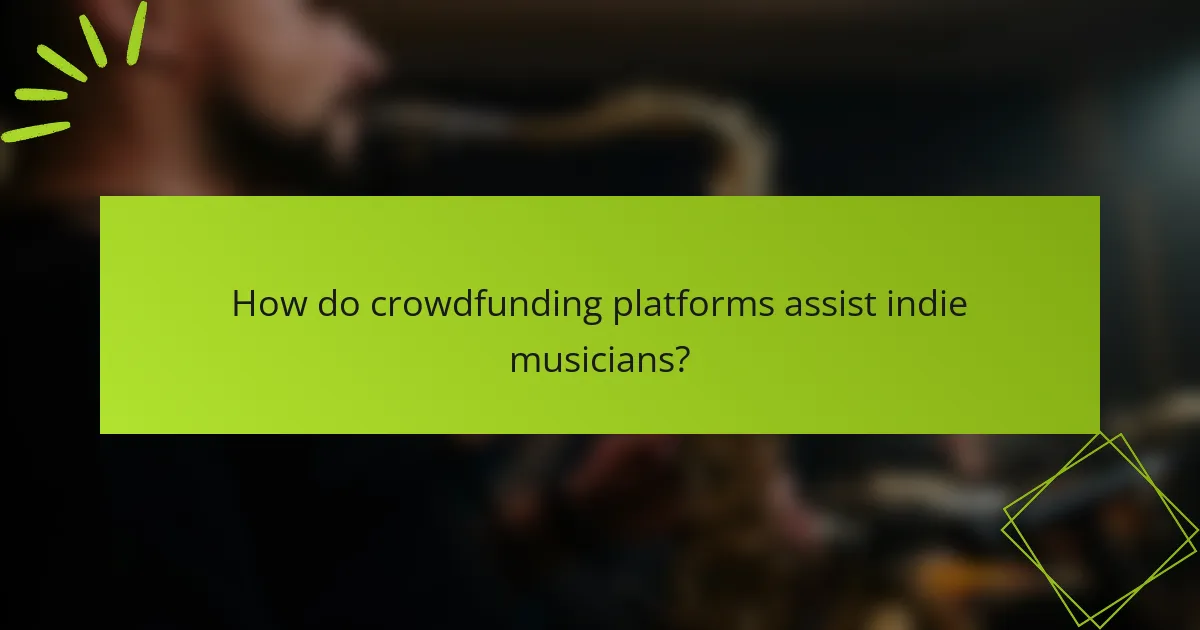
How do crowdfunding platforms assist indie musicians?
Crowdfunding platforms provide indie musicians with a way to raise funds directly from their fans and supporters. These platforms enable artists to finance their projects, such as album recordings or tours, by offering rewards or incentives in exchange for contributions.
Understanding crowdfunding platforms
Crowdfunding platforms like Kickstarter, Indiegogo, and Patreon allow musicians to present their projects to a broad audience. Artists create campaigns that outline their goals, funding needs, and what backers will receive in return, such as exclusive content or merchandise.
These platforms typically operate on an all-or-nothing basis, meaning that if the funding goal is not met, the artist does not receive any funds. This model encourages backers to contribute, knowing their support will only be used if the project is fully funded.
Key considerations for musicians
When using crowdfunding, musicians should set realistic funding goals based on their project needs and audience size. A common range for funding goals is between a few hundred to several thousand dollars, depending on the project’s scope.
Effective marketing is crucial. Artists should promote their campaigns through social media, email newsletters, and live events to reach potential backers. Engaging storytelling and clear visuals can significantly enhance a campaign’s appeal.
Common pitfalls to avoid
One major pitfall is underestimating the time and effort required to run a successful campaign. Musicians should allocate sufficient time for promotion and updates throughout the campaign duration, which typically lasts 30-60 days.
Another mistake is failing to deliver on promises. Artists must ensure they can fulfill rewards and keep backers informed about project progress to maintain trust and build a loyal fan base.
Examples of successful crowdfunding
Many indie musicians have successfully used crowdfunding to launch their careers. For instance, artists like Amanda Palmer and Chance the Rapper have raised significant amounts through platforms like Kickstarter and Patreon, enabling them to produce music independently.
These examples illustrate how effective crowdfunding can be when combined with a strong fan connection and strategic marketing efforts. Musicians should analyze successful campaigns to identify best practices and apply them to their own projects.
